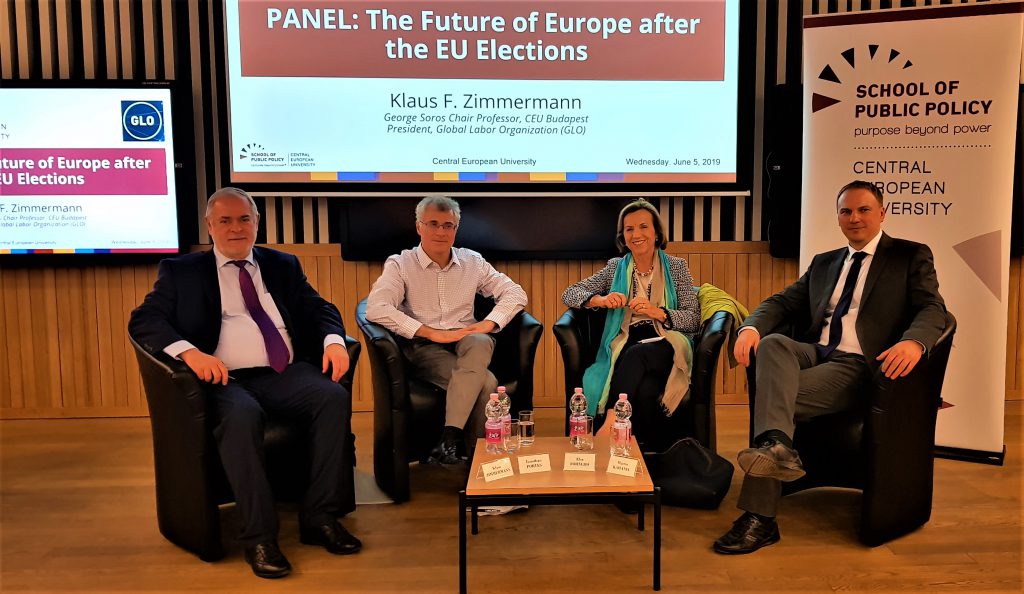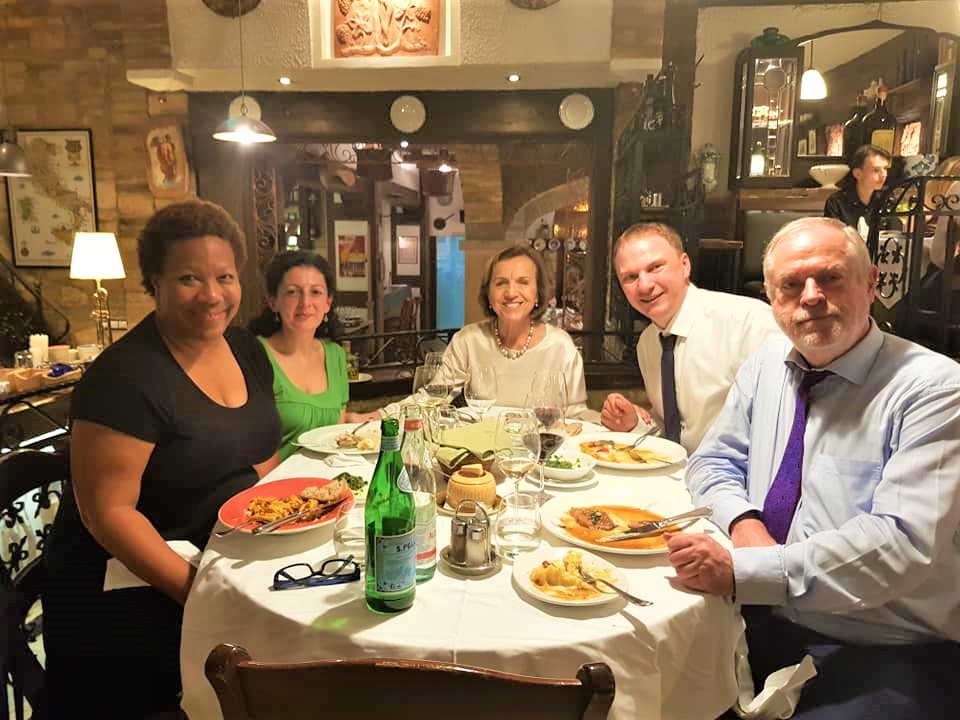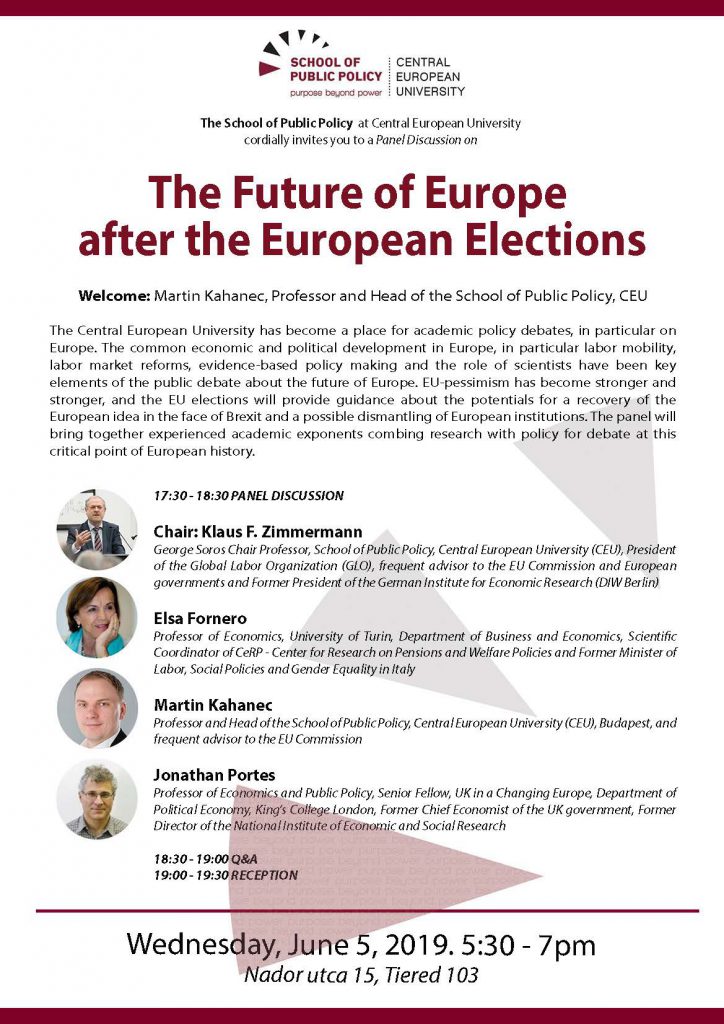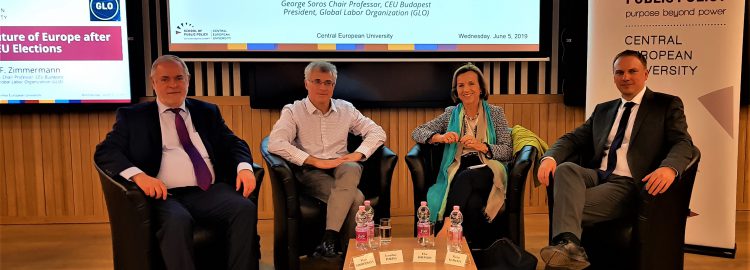Quo Vadis Europe after the European elections? Martin Kahanec and Klaus F. Zimmermann (both Budapest) debated on June 5, 2019 with Elsa Fornero (Turin) and Jonathan Portes (London) the consequences and perspectives for Europe in front of a larger audience assembled at the Central European University in Budapest. Zimmermann, President of the Global Labor Organization (GLO), was chairing and moderating the event; Fornero, Kahanec and Portes are GLO Fellows.
The common economic and political development in Europe, in particular labor mobility, labor market reforms, evidence-based policy making and the role of scientists have been key elements of the public debate about the future of Europe. EU-pessimism has become stronger and stronger, and the recent EU elections provide guidance about the potentials for a recovery of the European idea in the face of Brexit and a possible dismantling of European institutions. The panel brought together experienced academic exponents combing research with policy for debate at this critical point of European history.
Klaus F. Zimmermann, George Soros Chair Professor, School of Public Policy, Central European University (CEU), President of the Global Labor Organization (GLO), frequent advisor to the EU Commission and European governments and Former President of the German Institute for Economic Research (DIW Berlin); Chair & Panelist
- Populism and anti-globalism is on the rise.
- Evidence-based policymaking is losing weight.
- The value of migration and international institutions is questioned.
- The freedom of academic institutions gets under threat.
- Scientist are challenged to analyze and to respond to this development when also their insights are ignored.
- Voters move away from centrist parties, who lose majority.
- Pro-European liberals and greens become stronger and are now a third force.
- Anti-parties (anti-Europe, anti-migration) are stronger, but not dramatically.
- This is all a vote for a revival of the European idea.
- Facing strong global challenges from Asia, Africa and the USA, Europe needs to stick together and develop from its strength.
- More Europe not less is needed in the interest of the European nations and its people.
- This implies re-inventing the European idea and export some of its great institutions: social institutions, education and training and labor mobility.
Elsa Fornero, Professor of Economics, University of Turin, Department of Business and Economics, Scientific Coordinator of CeRP – Center for Research on Pensions and Welfare Policies and Former Minister of Labor, Social Policies and Gender Equality in Italy; Panelist
- Reforms must live in society with the people – workers, politicians, pensioners, etc. It is not a purely technical problem.
- We, technocrats, believed in reforms but the society did not accept them. The society misunderstood the policies as austerity measures.
- Economic models are dealing with prosperity, but real policymaking is about elections, which are always around the corner.
- The populists saw the weak points of reformists and the discontent of people and exploited them.
- Labor mobility and work in Europe should be reestablished as a right of the individuals and this should be in the center of the new Europe.
- We should strengthen the civil society – politicians and the elites should go out and talk to the people.
Martin Kahanec, Professor and Dean of the School of Public Policy, Central European University (CEU), Budapest, and frequent advisor to the EU Commission; Panelist
- These elections showed the discontent between East and West, South and North, globalists and localists
- In the 90s the region had a dream – get rid of the Soviets, which unified the societies. And move back to Europe – Schengen, EU, Eurozone, etc. However, after they joined the EU there is a vacuum of dreams. What is our next mission?
- Although the lowest election participation was in Slovakia, it is a EU positive country.
- Elites and workers feared migration from outside of Europe. But not internal labor mobility.
- Internal mobility helps build bridges over the old cleavages, but is also beneficial economically.
- Europe should have a policy for external migration which tackles the aging population challenge. The EU needs a migration framework, which is economically profitable, but also needs to have control and be predictable.
Jonathan Portes, Professor of Economics and Public Policy, Senior Fellow, UK in a Changing Europe, Department of Political Economy, King’s College London, Former Chief Economist of the UK government, Former Director of the National Institute of Economic and Social Research; Panelist
- The long term forces behind Brexit were not migration, but that the EU is not only an economic but also a political project. And the British felt that their positions in the world were threatened. Sentiments in this direction grew after the world economic crisis.
- The British attitude towards migration has changed after the referendum, becoming more positive. It has to do with a drop in the migration from the EU, and an increase from the outside. The gaps created were filled with workers from outside of the EU, and the need was better understood.
- The lack of control scared people because they wanted the “right” immigration
- If one provides a sense of control and of the existing trade-offs, the situation will approve.
- Thanks to the failure of May we are likely to have a hard Brexit or to reverse the results and stay in the EU. There is no middle ground anymore. Even if in a second vote the result would be “remain” – the issue would not be settled.
- People thought that Brexit would be easy and not painful; they now realize how wrong they were.
- If Germany turns into success its refugee immigration, then Germans would send to Europe a tremendously positive example.

From the left during the panel: Klaus F. Zimmermann, Chair, Budapest and Bonn; Jonathan Portes, London; Elsa Fornero, Turin; and Martin Kahanec, Budapest and Vienna.

After the panel during a joint dinner from the left: The Honorable Tanya Cook, USA; CEU Professor Anil Duman and GLO Fellow; Turin Professor and Former Labor Minister Elsa Fornero; CEU Dean and Professor Martin Kahanec; and Klaus F. Zimmermann, George Soros Chair, CEU, and GLO President.

Ends;

